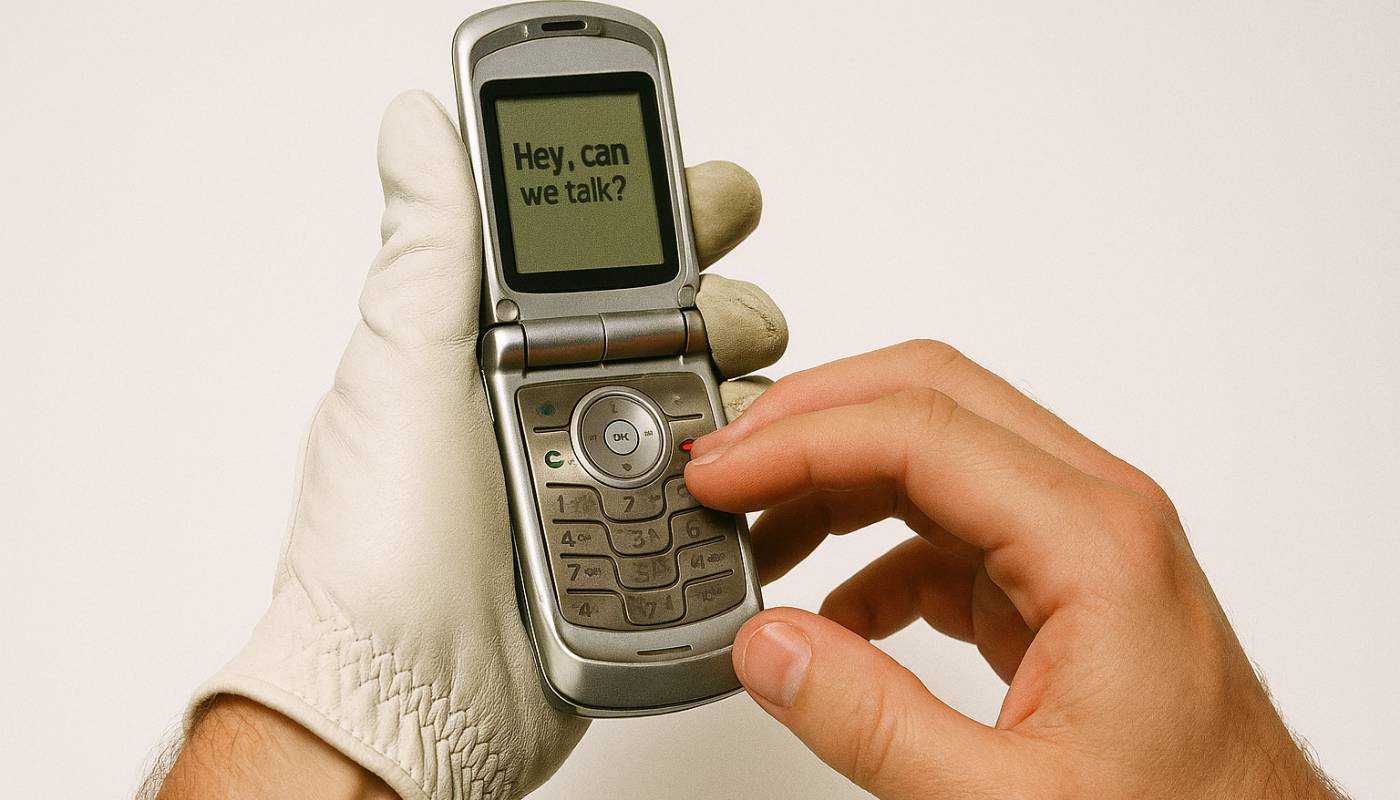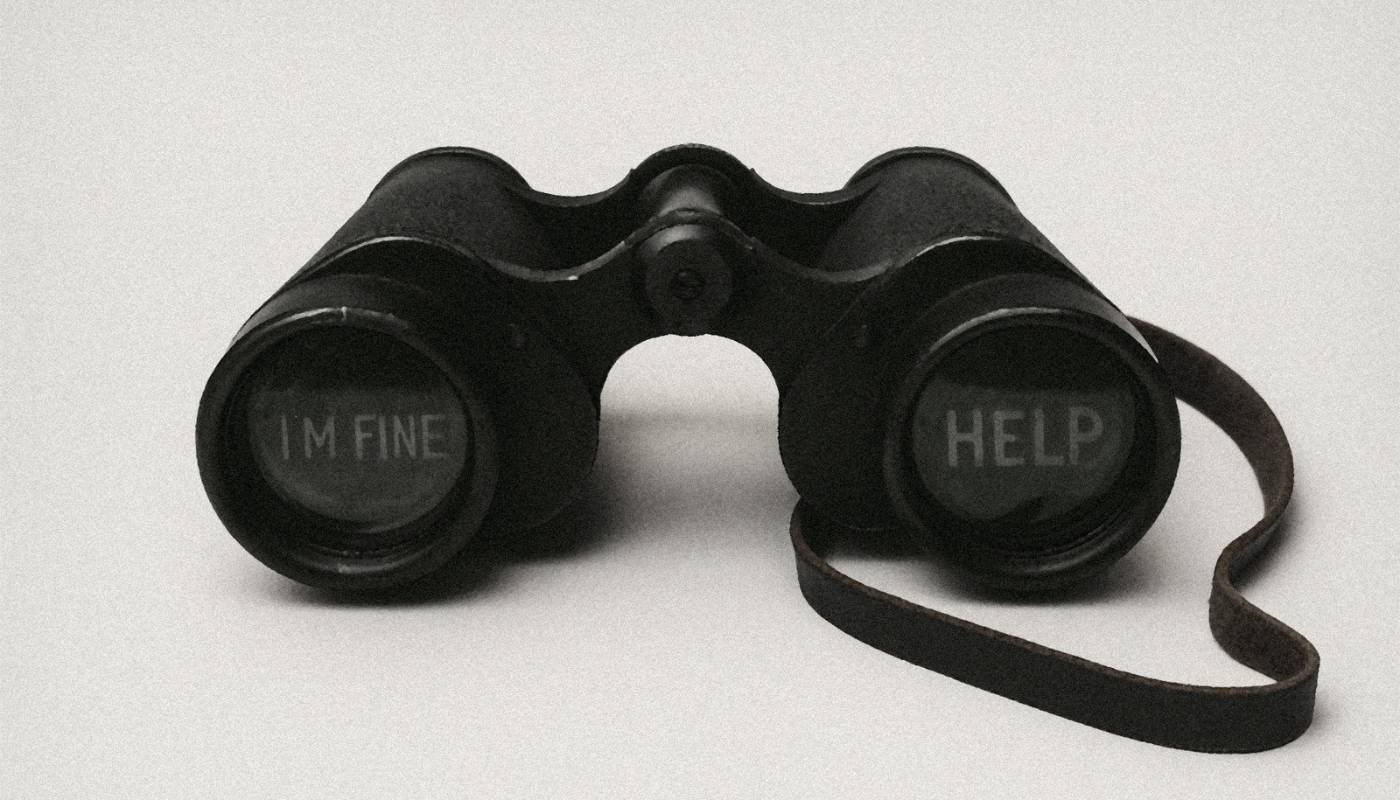Talking about your own head can be… tough.
Some days you can't explain it. Other days you know exactly what's going on. Even on those days, it's easy to second-guess it all. What if they don’t get it? What if they panic or freeze? Or worse, what if they start quoting motivational Instagram posts at you? Well, here's the good news: Speaking up doesn't have to be dramatic. Or polished. Or perfect.
You don't need the right words. You don't even need to know what's wrong.
You just need a starting point. A simple way to say "I'm not doing great" without feeling like you're handing over your entire emotional CV or accidentally making everyone panic.
Think of it like addressing the ball on a cold morning. It doesn't have to be your best swing. It just needs to get the round going.
This guide is here to help you do that.
{{crisis-main="/content-templates"}}
Quick takeaways
1. Start by Getting Clear(ish) with Yourself
Before you fire off a text or blurt something out mid-round, give yourself a second.
Try asking yourself:
- What's actually been weighing on me lately?
- What would I say if I wasn't trying to keep it together?
- Do I need support, or just someone to listen?
- What kind of reaction would feel most helpful?
Now try turning that vague tangle of feelings into one rough "I" statement. Something that puts the focus on your own experience, not the situation or anyone else.
Try something like 'I'm carrying a lot of stress and it's getting heavy' or 'I feel flat all the time and can't seem to shake it.' Maybe 'I don't even know what's wrong, I just know I'm not myself.'
It doesn't need to be polished. Or complete. You just need a starting point. Something small and honest you can put into words. And you don't need to wait until things get really bad. Speaking up early can make it easier later.
Obvious when you think about it, but easy to forget when you're in the thick of it.
{{divider-main="/content-templates"}}
2. Choose the Right Person and Time
Who you open up to can make a big difference in how the moment feels. And when you do it matters too.
You don't need to tell the loudest friend in the group chat. And you probably don't want to pour your heart out mid-pint, in the middle of the bar, with five other people pretending not to listen.
You just need one person who's likely to take you seriously. And a moment where you don't feel rushed, exposed, or on the spot.
A few things to keep in mind:
- Pick someone who makes space for you.
- Think about the people in your life who usually listen well. The ones who don’t rush, panic, or talk over you. That’s probably someone who can handle this too.
- Pick a moment that gives you room to breathe.
- Side-by-side chats are often easier than face-to-face ones. On a drive. Walking the course. Waiting at the range.
- You don’t need candles and tissues. Just a bit of calm, without too many distractions.
- Avoid high-stakes moments.
- The end of a big night out probably isn’t it. Neither is halfway through a family dinner. Look for a moment where you can take your time and step away if you need to.
If you're not sure who to talk to yet, that's alright. Start with someone who's made you feel at ease in the past. Or someone you trust enough to say "This might come out weird, but I've got something on my mind."
There's no best time. No perfect person. Just a good-enough moment and someone who won't make it harder than it already is.
{{divider-main="/content-templates"}}
📱Text It, Write It, Record It
Opening your mouth feels hard. Opening your Notes app somehow feels less hard.
If saying it out loud feels too much, try starting in a different way:
- Text it.
A short message like "Hey, I've been feeling off. Can I talk to you later?" can open the door without the pressure of a live conversation. - Write it down.
Scribble a note or type it out. Even if you never send it, getting your thoughts on paper can help you figure out what to say. - Voice note. Yes, it sounds weird. But it can also work. Speaking into your phone is sometimes easier than face-to-face. Plus you can delete it and try again if it comes out like nonsense.
Whatever gets the thing out of your brain and into the world counts. There's no award for doing it the "right" way.
{{divider-main="/content-templates"}}
3. Find Your Opening Line
So you know roughly what's up, and you've got someone in mind. Now for the bit that feels like trying to tee off when your hands are shaking, there's a foursome breathing down your neck, and you've forgotten which end of the club to hold.
How do you actually start the conversation?
This bit often feels heavier than it actually is. You're not delivering a monologue. You're just cracking the door open. One sentence is enough to shift the weight a little.
Keep it short. Keep it honest. Let it sound like you.
Framing it as an "I" statement helps. It puts the focus on what you're feeling, not what's wrong with the world, or what someone else did. It's clearer. Less loaded. Easier for the other person to hear.
Try something like:
- "I've been feeling pretty low lately."
- "I've had a lot on, and it's been getting to me."
- "I don't know exactly what's up. I just don't feel like myself."
- "Not gonna lie, I'm struggling a bit right now."
- "I've not been feeling like myself lately, and it's been hard to shake."
You can text it. Say it mid-walk. Drop it in when the moment feels right. Doesn't matter how polished it is. Just pick something that feels doable, and start there.
Once you've said something, you've done the hardest bit. The rest can just be two people having a proper chat.
{{divider-main="/content-templates"}}
4. Keep It Simple
You've said something. Door's open. That's the hardest part done.
Now your brain might be whispering things. Do I need to explain everything? Should I go deeper? Should I be delivering some kind of emotional masterclass?
Let's be clear: no, no, and absolutely not (unless you want to).
This is just a conversation. And you're allowed to keep it short, vague, messy, or unfinished. You're allowed to stop at "I've just been feeling off lately." Or "It's been a rough patch. I'm not really sure what's going on."
That's enough. More than enough, actually. You've already done the hardest part in letting something out.
If more comes up, great. Let it. But if it doesn't, that's okay too. You're not here to unpack your entire emotional history in perfect chronological order. You don’t need a Netflix special to explain yourself. It’s just a conversation.
Here's what helps to remember:
- You don't owe anyone a detailed explanation
- You're allowed to say "I don't really want to get into all the details"
- You can pause the chat and pick it up another time
- Keeping it simple doesn't make it less valid
Some days the words will flow. Other days, you'll barely get one sentence out before your brain wants a nap. Both are fine. Both count.
{{divider-main="/content-templates"}}
5. Be Ready For Any Reaction
Alright, you've put it out there. What happens next?
Even the best friends can get awkward in these moments. Some freeze. Some throw out clumsy advice. Some mean well but panic and change the subject.
It doesn’t mean they don’t care. It usually just means they weren’t expecting it and their brain did that thing where it panics, forgets how to human, and blurts out something slightly off.
Worth remembering:
- Speaking up was the strong part. Their reaction doesn’t change that.
- If their reply’s a bit clunky, give it a second. Most people are better once they’ve had a second to think.
- You can gently steer the moment with something like: "I'm not expecting you to fix it. I just needed to say it out loud." That line does a lot. It gives them permission to just listen.
And if they don’t say much back? That’s fine too. A quiet nod. A “thanks for telling me.” Even just sticking around. Sometimes that’s exactly what support looks like.
If they do show up well (kindness, patience, a weirdly comforting joke) that's your green light to keep going if you want to.
If the first reaction isn’t what you hoped for, you’re still allowed to speak again. Either to them or to someone else.
Bottom line:
You can’t control their reaction. But you can decide what you share, how long you stay in the chat, and whether you want to pick it up again later.
Whatever happens next, the heavy bit's already done. You said something. You're not carrying it alone anymore.
{{divider-main="/content-templates"}}
6. Know What Help Looks Like (and Where Else to Turn)
Not every chat needs to end in “Have you tried therapy?” Sometimes the biggest help is just getting something off your chest.
But if you've opened up and things still feel heavy, or you're stuck and not sure what to do next, it might be time to get a bit more support. That doesn't mean something's seriously wrong. It just means you're human and you might need to talk to someone who knows how to help.
Sometimes that means a mate checking in more often, or doing something small that makes you feel more like yourself. Maybe chatting to your doctor or calling a helpline if you want to talk anonymously.
Support isn't a one-time thing. It's something you can keep coming back to as often as you need.
You don’t have to power through alone. Good support exists and you deserve it.
👉 Need help figuring out next steps? Head to our GET HELP page.
{{divider-main="/content-templates"}}
Quick Checklist: Speaking Up
Heading into the conversation? Run this quick pre-shot routine.
☑️ I’ve taken a second to check in with myself
☑️ I’ve got a rough idea of what I want to say
☑️ I’ve picked someone who feels safe and steady
☑️ I’ve found a moment that’s calm and low-key
☑️ I’ve got a simple line to start with—nothing fancy
☑️ I know I don’t have to explain everything
☑️ I’m ready for any kind of response
☑️ I know where else to turn if I need more support
{{divider-main="/content-templates"}}
And If Someone Opens Up to You…
This guide’s been about finding the courage to speak up. But one day, it might be your friend on the other end of that chat.
You don’t need the perfect words. You just need to stay present.
Here’s what helps:
Don’t panic. Don’t fix. Just listen.
You don’t need a solution. You just need to let them speak.
Keep it calm and low-pressure.
A quiet “thanks for telling me” or “I’m here if you need” can go further than you think.
Let them go at their pace.
Silence isn’t awkward, it’s thinking time. You’re not there to rush them to a conclusion.
Check in again later.
A simple “how’ve you been feeling since we chatted?” tells them the door’s still open.
If you have concerns about your mental health or well-being, please speak to a qualified health or mental health professional.
%20(13).avif)


.jpg)





.jpg)







.avif)